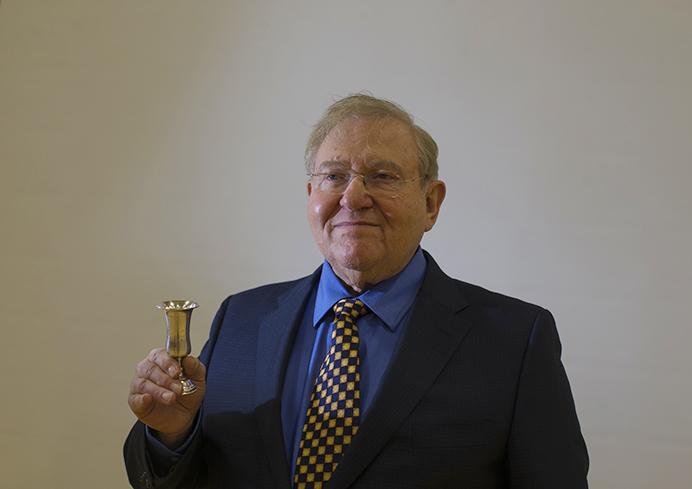Memories of Auschwitz
March 29, 2017
“I’m ready to roll up my sleeve and tell you about prisoner B1148.”
After keeping his sleeves rolled down, covering his identification tattoo from Auschwitz, and after living a happy life, Holocaust survivor Michael Bornstein is now sharing his story after more than 50 years of believing it would be easier to forget.
Bornstein, one of the youngest survivors of the Holocaust, returned to campus to discuss his experiences of going “From Auschwitz to Iowa City.” The University of Iowa Alumni Association hosted the Wednesday night event in the IMU Main Lounge.
“Stories are what connect us to our shared humanity and to each other,” said Kathryn Howe, the editor of the Iowa Alumni Association Magazine. “… These are uncertain times we live in, and it can be a struggle to know which direction to go, but there’s only one way, and that’s forward. My hope is that we can draw upon the past to lead us into the future.”
As a little boy, Bornstein spent seven months in Auschwitz while his mother was sent to an Austrian labor camp. They later reunited and immigrated to New York City in 1951. While Bornstein was young at the time, he doesn’t forget; the smell of burning flesh and sound of Nazi marching boots linger with him to this day.
“Growing up, [being a survivor] affected me quite a bit,” he said during a press conference earlier on Wednesday. “I have quite a bit of trouble now getting rid of food, and the same thing with money. I’m frugal. We came to the United States as homeless people. I started working in a drug store for 50 cents an hour. With the first $200, I bought my mother a black-and-white television set.”
During his time in both the state and the UI, Bornstein, a proud Hawkeye, met the woman who became his wife of 50 years and started his family. He later went on to work at Eli Lilly and Johnson & Johnson as a researcher after earning a Ph.D. in the College of Pharmacy.
“Education is so important for everyone, I would say,” he said at the press conference. “It gave me a chance to lead a normal life.”
After facing Holocaust deniers and the reality that other survivors would not be alive much longer, Bornstein — with the help of his daughter, Debbie Bornstein Holinstat, whom he described as a “very persistent person” — decided it was the right time to document his experiences through their cowritten book, Survivors Club.
“[A Holocaust denier website] showed my picture and said, ‘Look how healthy this kid looks. Auschwitz wasn’t so bad. They’re all lies,’ so it was time to write the book,” he said at the press conference.
Holinstat said the rise in anti-Semitic crimes and other hate-fueled incidents against minority groups made the timing for the book’s publication just right. By helping share her father’s story, she hopes others learn that discrimination and intolerance must stop.
One way to do this, Holinstat said, is to be an upstander rather than a bystander.
“If it’s discrimination against Muslim people, if it’s discrimination against gay people, whether I know them, whether I don’t know them, I need to speak up,” she said. “… One of the best ways we can speak up now is with our votes.”
Many of the items from Bornstein’s childhood home in Zorki, Poland, are gone; most have been stolen. One of the remaining objects, however, is a watch given to him by his mother with a Hebrew inscription on the back: “This too shall pass.”
“When things are bad, they don’t work out right, there will come another day and things will work out,” he said.



